The exhilarating world of eCommerce is bustling with opportunities waiting to be seized. However, amidst this potential lies a common hurdle many face – managing a fluid, engaging flow of digital content. The competition is stiff, with businesses vying for the attention of the same pool of customers.
It’s a race where the swift, organized, and captivating take the cake. That’s where the magic of a robust Content Management System (CMS) comes into play. A CMS not only tidies up your digital space but also presents it in a way that resonates with your audience, making your online store a pleasant place to shop.
As we venture into the realm of top CMS platforms, you’ll discover how each platform helps in curating, managing, and optimizing content to not only draw customers in but also keep them coming back.
This guide is your map to exploring CMS for eCommerce, outlining the features, pros, cons and pricing for each of the top contenders. But, before we dive into the top platforms, let’s figure out how to determine what’s best for your eCommerce business.
How to Choose the Best CMS Platform for Your Business

The right CMS is more than just a tool; it’s your partner in weaving together the various threads of digital commerce into a coherent, appealing narrative that propels your business forward. The choice of platform will largely dictate your content distribution process, so use this guide to research thoroughly.
There are hundreds of different CMS platforms out there, each catering to unique goals, budgets and preferences. So, before we jump to our CMS platform comparison, let’s break down what makes a good CMS for eCommerce:
- Ease of Use
- Pricing
- Customizations
- Extensions
- Support
Ease of Use:
The right CMS will simplify the task of creating and editing content, often featuring a drag-and-drop interface for effortless page editing. Post-publishing changes should be straightforward, enabling quick adjustments whenever needed. This ease in managing content allows you to keep your online store updated, ensuring a seamless user experience.
Pricing:
CMS platforms can range from free to hundreds of dollars each month, depending on the company and it’s features. When selecting a software, it’s important to research all associated costs, including plugins or extensions, to ensure it fits within your budget.
Customizations:
A comprehensive selection of website design templates is crucial for brand representation. Your CMS should allow for easy customization of these designs to meet your unique requirements, ideally without the need to delve into coding. This not only enhances the visual appeal but also significantly contributes to the user-friendly aspect of your site.
Extensions:
Every website has unique requirements, and a one-size-fits-all approach doesn’t work in the realm of CMS. Extensions and add-ons provide the ability to tailor the CMS to your specific needs, extending its functionality whenever needed. Think of them as valuable add-ons that enhance the capabilities of your CMS, much like apps on a smartphone.
Support:
Even the most intuitive CMS platforms can present a learning curve. When you encounter a hiccup or have questions, having access to helpful support resources is invaluable. Some CMS platforms have a robust community or a responsive customer service team, ensuring you have the assistance needed to overcome challenges.
The 10 Best CMS for eCommerce
Now that you know what to look for, it’s time to dive into what each platform has to offer. This list is only the tip of the iceberg, but a great place to start your search and discover the most popular options out there. Let’s dive in!
1. WordPress

WordPress, the largest CMS in the industry, is renowned for its massive range of options and versatility. Initially designed for blogging, WordPress has since evolved to support various types of websites including eCommerce platforms, primarily through the integration of plugins like WooCommerce.
Pros:
- Flexibility for different website types (e.g., online stores, auction sites).
- No technical skills or coding knowledge required.
- Extensive range of themes and plugins for customization.
- Well-designed for SEO.
- Large supportive community.
- Extensibility making it suitable for both beginners and developers.
Cons:
- Hosting, domain setup, and management are required.
- The vast array of options can be overwhelming for beginners.
Pricing:
WordPress is free, but a domain name (around $9 – $15 per year) and hosting service (normally from $7.99/month) are needed.
Special deals with certain hosting providers like Bluehost can lower the cost to $2.75/month including a free domain and SSL certificate
2. Shopify

Shopify is a powerhouse in the eCommerce platform sector, known for its ease of use, sleek design, and robust features that help entrepreneurs streamline their online stores. This platform is ideal for a broad range of business sizes and types, boasting a user-friendly interface along with an expansive app and theme store to enhance store functionality and appearance.
Pros:
- User-friendly interface for easy setup and management.
- Variety of customizable themes, both free and paid.
- All-in-one solution providing hosting, domain purchase, and other essentials.
- Extensive customer support including a 24/7 helpline and chat support.
- Supports over 100 payment gateways for flexible payment processing.
Cons:
- Monthly fees can accumulate, especially with paid apps and themes.
- Additional transaction fees for payment gateways other than Shopify Payments.
- May lack the level of customization available on other platforms like WordPress.
Pricing:
Shopify offers a range of plans tailored to different e-commerce needs. The Basic Shopify plan starts at $29 per month, while the Shopify plan is priced at $79 per month. For businesses with extensive requirements, the Advanced Shopify plan is available at $299 per month. Furthermore, Shopify provides Enterprise options to accommodate businesses with specialized needs.
3. Adobe Commerce (Magento)
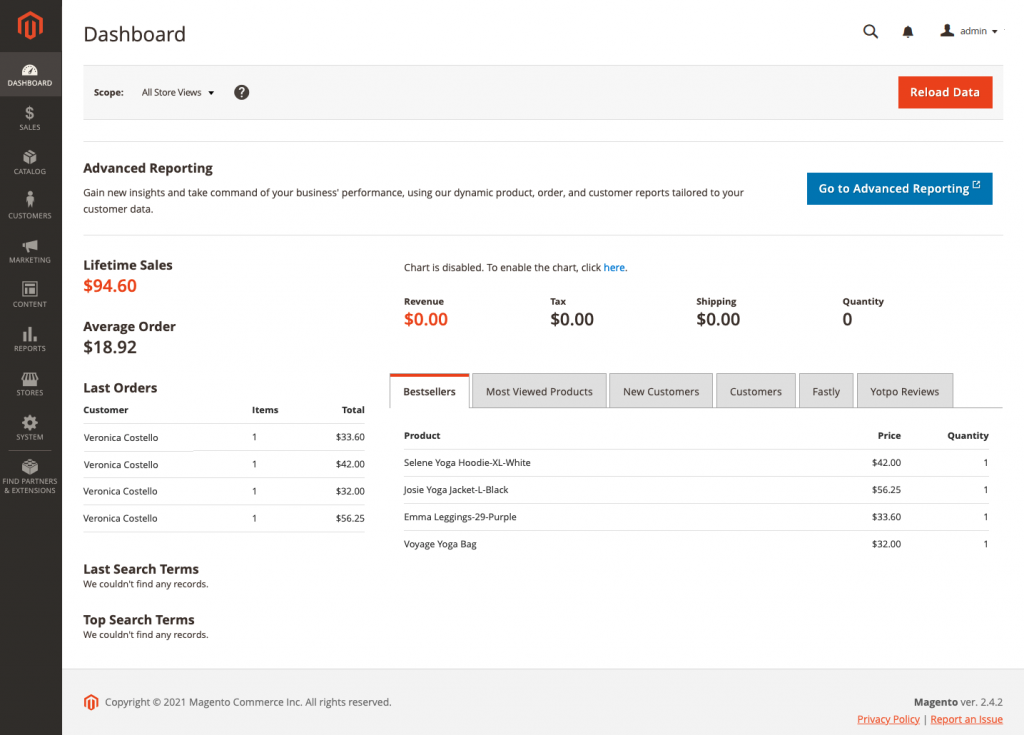
Magento is recognized for its robustness and flexibility in the eCommerce platform industry, favoring large businesses and enterprises. It offers a high degree of customization and scalability, making it a suitable choice for businesses with a vast array of products.
Pros:
- High degree of customization for specific business needs.
- Scalability suitable for large businesses and extensive product ranges.
- Strong community of developers and users contributing to an extensive library of plugins and themes.
Cons:
- Complexity can be intimidating for beginners or those without technical expertise.
- High running costs for dedicated hosting and potentially developer assistance for setup and maintenance.
- Setting up a store can be time-consuming due to its complex nature.
Pricing:
Magento Open Source is Free, but requires hosting and other associated costs. Magento Commerce is quote-based, tailored to the size and needs of the business.
4. BigCommerce
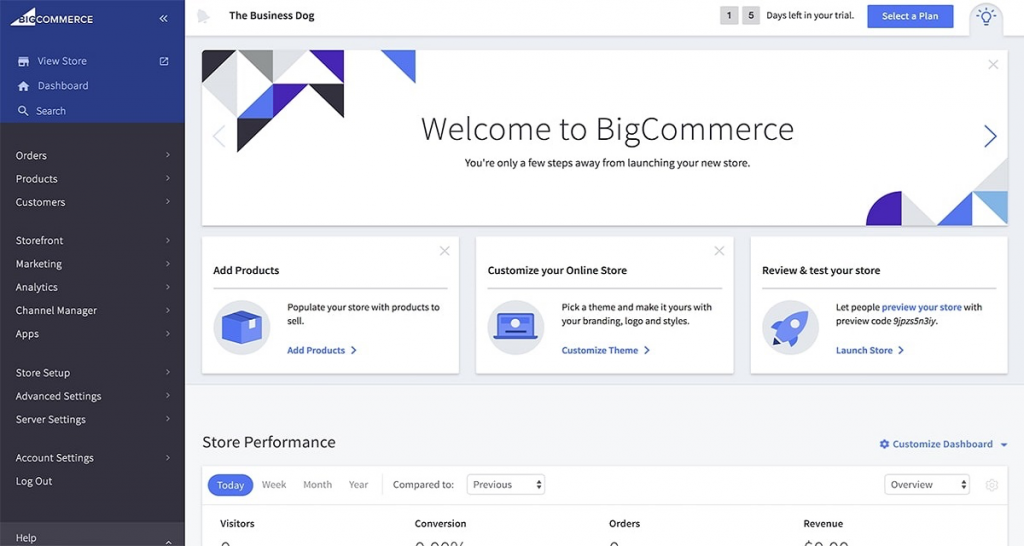
BigCommerce is a user-friendly eCommerce platform with a drag-and-drop website builder and extensive product options. Its in-built blogging and SEO tools facilitate organic growth, while the robust reporting functionality aids in data-driven decision-making.
Pros:
- Well-rounded entry-level plan.
- Drag-and-drop website builder facilitating easy setup.
- Extensive product options.
- In-built blogging and SEO tools.
- Robust reporting functionality.
Cons:
- Absence of abandoned cart recovery in the standard plan.
- Limited free theme options.
- Extra charges for content customization.
Pricing:
BigCommerce offers pricing plans to suit various e-commerce needs. The Standard Plan is $29.95 monthly or $29 per month with annual payment. The Plus Plan is $79 monthly when paid annually. For advanced features, the Pro Plan costs $299 per month annually. BigCommerce also provides Enterprise solutions for unique business requirements.
5. Drupal Commerce
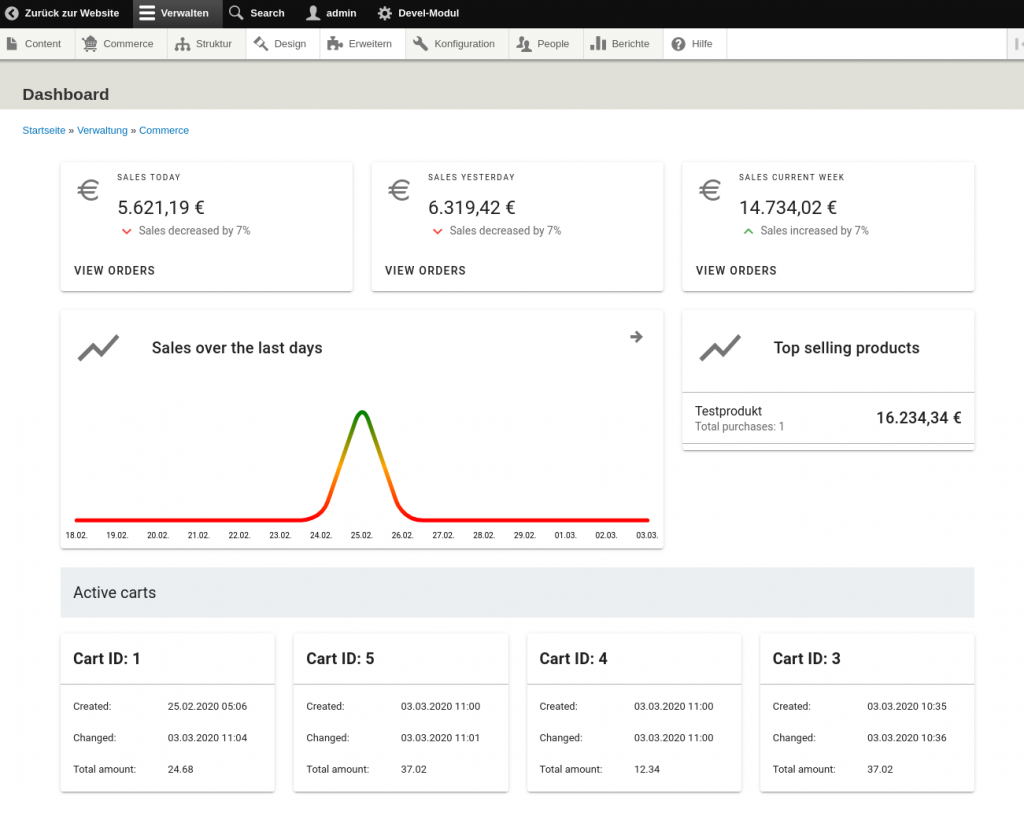
Drupal Commerce is a modular eCommerce solution designed for seamless integration with Drupal CMS. Its high customization, extendability, and active community support make it ideal for content-rich sites or bespoke online retail setups, with an affiliate program adding a revenue generation avenue.
Pros
- Highly customizable and extendable.
- Strong integration with Drupal, making it a powerful choice for content-rich sites.
- Community-driven with active developer support.
Cons:
- Steeper learning curve, especially for those unfamiliar with Drupal.
- Requires self-hosting and domain setup.
- Might require developer assistance for setup, customization, and maintenance.
Pricing:
Free to download and use, but additional costs may arise from hosting, domain registration, and optional modules or themes.
6. Wix

Wix is a robust platform recognized for its user-friendly drag-and-drop interface, making it a popular choice among individuals who are new to website building. With a large array of templates and over 200 app integrations, Wix provides a flexible platform for creating a variety of eCommerce sites. The SEO capabilities integrated within the platform also ensure that online stores are optimized for search engines right from the start.
Pros:
- User-friendly drag-and-drop interface for easy site creation.
- Extensive range of app integrations (over 200) to extend functionality.
- Built-in SEO features to help rank your store on search engines.
- Diverse template options to create a visually appealing online store.
Cons:
- Lack of visitor analytics on free or Combo plans.
- Storage limits on all plans which can be restrictive for larger sites.
Pricing:
Wix has a variety of premium plans offering better customization and features: Light ($16/month), Core ($27/month), Business ($32/month), Business Elite ($59/month), with Enterprise solutions having custom pricing.
7. Squarespace

Squarespace stands out for its sleek design and user-friendly interface, which allows for easy online store creation and management. Known for its professional-looking templates and strong eCommerce features, Squarespace is ideal for those seeking a more premium, straightforward site-building experience. It provides multiple payment and shipping options, along with built-in eCommerce, marketing, and SEO tools to help businesses thrive online.
Pros:
- Easy online store creation and management with a variety of payment and shipping options.
- Built-in eCommerce, marketing, and SEO tools to promote and optimize your online store.
- Professional, high-quality design options for a visually stunning online presence.
Cons:
- No 24/7 Live Chat support which can be a hindrance for immediate assistance.
- Monthly rates can be on the higher side, making it a more premium-priced provider.
- Limited eCommerce integrations and payment gateways which could affect store functionality.
Pricing:
Squarespace provides various pricing tiers for website building. These include the Personal plan at $12 per month, the Business plan at $18 per month, the Basic Commerce plan at $26 per month, and the Advanced Commerce plan at $40 per month. These options allow users to select the plan that aligns with their specific website requirements.
8 PrestaShop
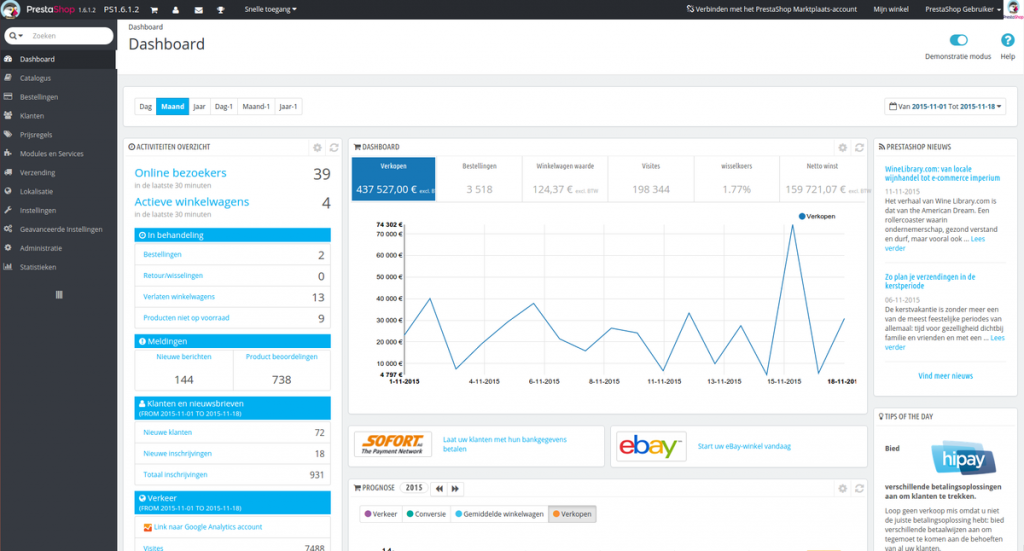
PrestaShop is a free, open-source eCommerce platform that provides a range of modules and add-ons for enhanced functionality through the PrestaShop Marketplace. It supports various payment gateways and offers access to over 3,000 mobile-optimized templates. Its powerful set of integrations, eCommerce SEO, and integrated customer service tools make it a robust choice for online retail.
Pros:
- Free and open-source platform.
- Wide range of modules and add-ons for increased functionality.
- Supports a wide range of payment gateways.
- Access to over 3,000 mobile-optimized templates.
- Powerful set of integrations for enhanced eCommerce operations12.
Cons:
- May require technical expertise for setup and customization.
- Limited customer support.
- Some users find it less intuitive compared to other platforms.
Pricing:
PrestaShop’s core software is free, however costs may arise from hosting, domain registration, and purchasing additional modules or templates.
9. Joomla
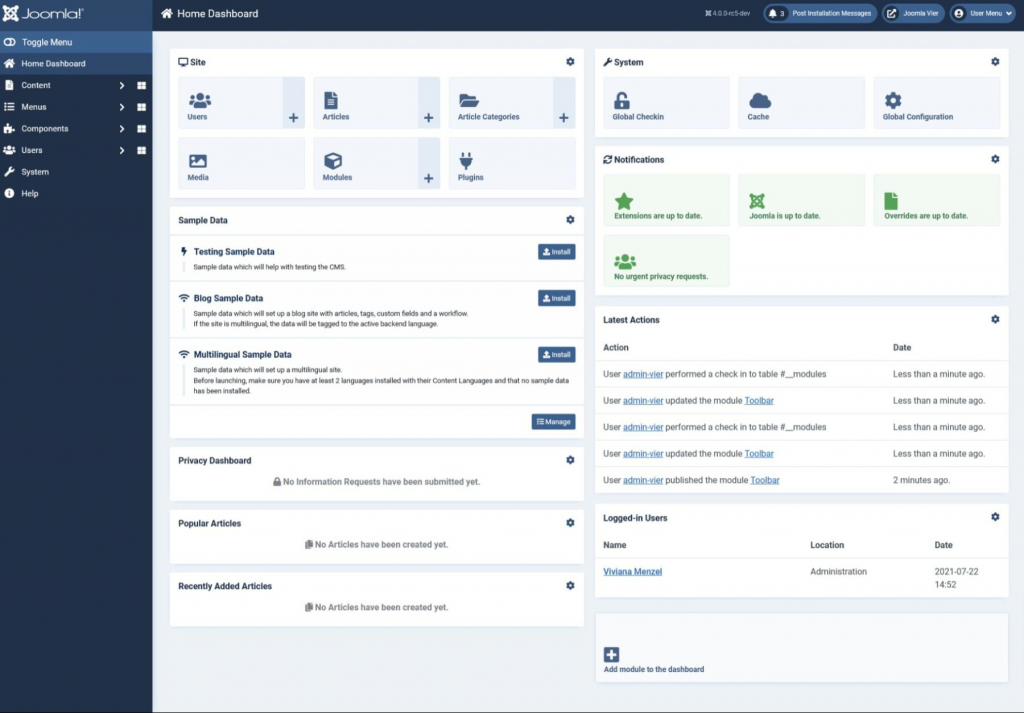
Joomla is a prominent open-source content management system known for its versatility in creating different types of websites, including eCommerce platforms. The platform’s eCommerce capabilities can be enhanced through extensions like VirtueMart, offering a robust environment for online retail.
Pros:
- Open-source platform allowing for code modifications without licensing fees.
- Hundreds of free extensions templates available for enhanced functionality.
- Can manage both content and online store in one place, avoiding the need for multiple platforms.
- Known for security, layered and detailed user control, and multilingual support.
Cons:
- May require technical expertise for setup and customization.
- Limited customer support, as is common with open-source platforms.
Pricing:
Core Joomla software is free, though there’s a pricing plan starting from $199.00 for additional features and support.
10. OpenCart
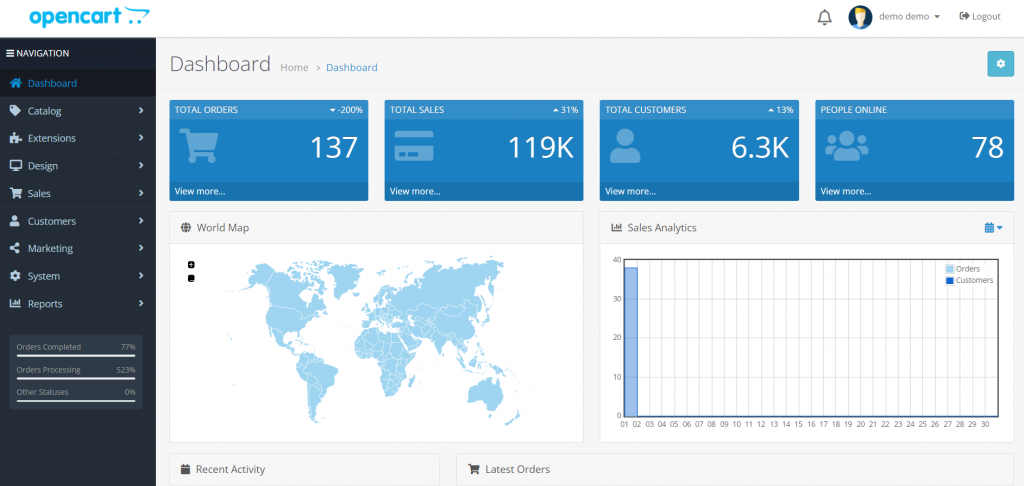
OpenCart is a free, open-source eCommerce platform that’s relatively easy to use and comes with a variety of features to support online retailers. Its modular system and a plethora of available extensions make it a flexible choice for those looking to tailor their eCommerce site to specific needs.
Pros:
- Open-source and free, offering a cost-effective solution for small to medium-sized businesses.
- Modular system allows for extensive customization through various extensions.
- Large community support with plenty of available resources and extensions.
- Multiple payment gateways and shipping method integrations available.
Cons:
- May require some technical expertise to tackle more advanced customization or troubleshooting.
- Customer support largely depends on community forums or third-party developers, which might not always be reliable.
Pricing:
OpenCart core software is free. Costs may arise from hosting, domain registration, and purchasing additional modules or themes.
Maximizing Success with the right CMS for eCommerce

In the ever-evolving world of e-commerce, choosing the right Content Management System (CMS) can make a substantial difference in your business’s success. A well-selected CMS can streamline your online operations, enhance user experiences, and provide a solid foundation for growth.
However, it’s not just about the technical aspects; content creation and marketing strategies play a pivotal role in e-commerce success. In this section, we will explore how selecting the right CMS, coupled with effective content creation services, can help you maximize profits. We’ll also discuss the benefits of outsourcing these services to experts in the field.
Empowering Your Store with the Right CMS
Selecting the ideal Content Management System (CMS) is pivotal for e-commerce success. A robust CMS provides a user-friendly interface that simplifies product management, seamless integration that enhances the shopping experience, scalability that accommodates growth seamlessly, and SEO optimization that boosts search engine rankings.
Crafting Compelling Content
High-quality content is paramount in e-commerce. It engages visitors, building trust and brand loyalty. Captivating content not only persuades visitors to make purchases but also plays a critical role in:
- SEO Benefits: Well-crafted content improves search engine visibility, attracting more organic traffic to your site.
- Educating Your Audience: Through blogs and informative content, you can educate your audience about your products, industry trends, and how-to guides, positioning your brand as a reliable source of information.
- Showcasing Product Value: Detailed product descriptions and multimedia content help customers understand the value and benefits of your offerings, increasing the likelihood of conversions.
- Establishing Authority: Consistent, valuable content establishes your brand as an authority in your niche, attracting more customers and driving long-term success.
Outsourcing for Profit Maximization
Outsourcing content creation services, such as blogs, emails, and social media, can be a strategic move to maximize profits. Experts bring industry knowledge and efficiency, ensuring consistency and scalability in your content strategy.
Outsourcing allows you to take advantage of high-quality content while still focusing on core business activities and achieve e-commerce success. If you’re interested in maximizing your profits with engaging SEO content, visit our contact page to get in touch!

